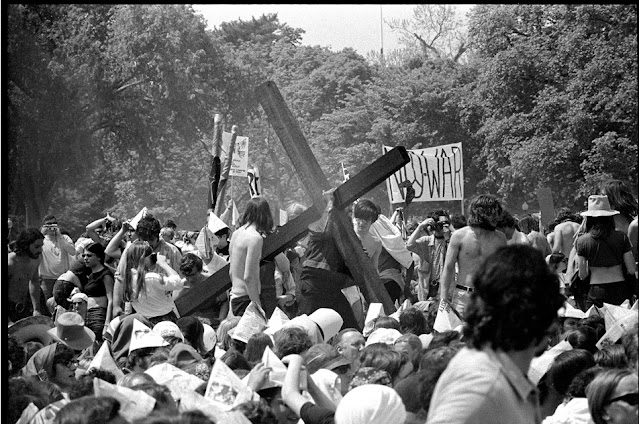With no more than a month left in my college education, the national draft lottery now behind all of us--February 17 was chosen 187th--and a selective service physical coming up soon, I woke up on one of the first days of May, 1970, to NPR news and listened as some commentator said that a young anti-war protestor, Sam Brown, who I knew was from Iowa, was sounding the call for college students from around the country to come to Washington D. C. for a huge protest. Four Kent State students had been shot dead, at least two of them nothing more or less than spectators. Seemed to me almost to be war, right there on campus.
It was a news items, not an advertisement, but something in me determined right then and there, that I had to go. I was a college student, I had openly declared myself to be anti-war, I'd let it be known I considered President Nixon's expansion of the war into Cambodia and Laos to be evil, and I was really tired of being so far out of the mainstream of dissent and protest. I'd even tried to drum up some support against the war.
I don't remember how I got hooked up with the two guys who also determined to go, but I believe we all worked on the student newspaper. One of them I really didn't know at all, the other a former roommate, was something of delightful eccentric but someone I knew shared my politics. We decided to take my ex-roommate's VW bug on a 20-hour trip out east, with stops in Chicago and somewhere in Pennsylvania, where the ex-roomie had friends, and then be there, in D. C., to join this massive protest arising in response to the murder of those four Kent State students.
The experience itself was not what I thought it might be. I wrote an article--a long one--in the college newspaper describing how alien it felt to be there, which was something of a surprise since I'd told myself that I'd feel very much more at home surrounded by war protestors than I had with all the war hawks on the Dordt campus. There was a ton of weed being smoked, lots of bell-bottoms, no end to the long hair, and, for the most part, no bras. Protestors skinny-dipped in the tidal pools, and everywhere, everywhere, there were people, a hundred thousand, I remember. I'd never been in a crowd of 100 thousand people, never have since. Somehow, to me, the whole thing seemed more of a party, a bacchanal, than a real, ardent protest. My Calvinism was showing.
I was, just then, the catcher on the Dordt College baseball team, and we weren't half-bad. My going to Washington meant my missing a double-header on Saturday; so before I left, I knew I'd have to tell the coach, a man I knew certainly did not share my politics. So I told him. He tried to talk me out of it, then realized it wasn't going to happen. He said he'd have to consider what my place on the team might be when I'd return, and I assured him that I understood that, and I was willing to accept any punishment he might give me. I suppose, in some ways, symbolically at least, that little meeting outside the library was the moment in my life when sports descended from the prominence they once maintained.
After we returned, he told me I could rejoin the team. He said--I'd heard the story myself from my teammates before we'd talked--that he'd taken the question to my teammates, explained my deep desire to join this big national protest, told them I'd come to him and indicated my willingness to be off the team if that what he wanted. He then had them vote--up or down, for or against Schaap's reinstatement behind the plate. They voted up. Still makes me giggle.
For more than fifty years I've smiled about that. The great war protest of my life cost me a double-header against a baseball team I can't name. But my teammates, most of whom, I'm sure, didn't share my politics, gave me the courage of my youthful and idealistic convictions.
Just two weeks later, some guy in uniform told me to pull my pants on because I was going home. I'd been in line for my military physical, but at that moment I was out of the draft, out of the service. My weird heart was a condition the Army didn't care to treat in Vietnam rice patties, and I didn't have to make a decision that kept me up nights back then, whether to take up arms in a war I opposed, or get myself safely over the border north, to Canada.
I'd put off hunting for a teaching job because I had no idea what might come of my life after college graduation, the draft looming. Once the military was now solidly behind me, and after a Dordt College graduation ceremony, I was out, out of everything--out of baseball, out of college, out of employment.
The night before graduation a bunch of us went out to a dance club, as I remember, where we had a few drinks, nothing awful. Somehow--I don't remember how--we ended up in the women's dorm, where every last room, it seemed, even in the darkness, I couldn't help seeing sheets and pillow cases in a bundle outside the door. I never felt quite so alone. I had a diploma, but nothing more--no girlfriend, no job, no design for a future.
But I knew that what I'd experienced in that final semester of college life, not to mention by the way of the Presidency of Richard Nixon, Tricky Dick, I knew that I had chosen to take up arms with the Democrats.


No comments:
Post a Comment